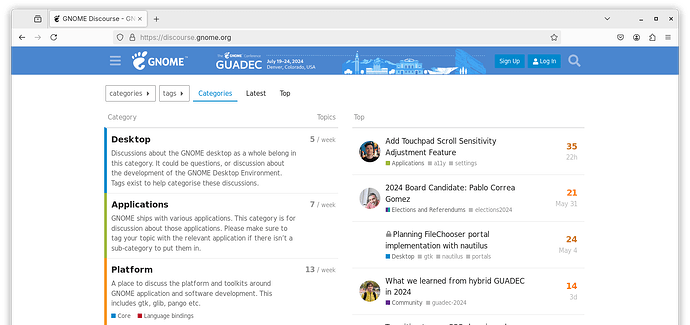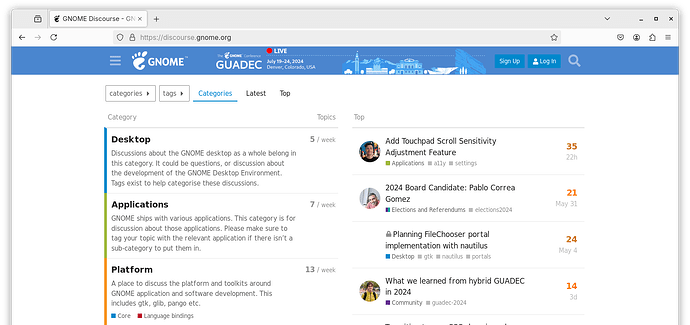Thank you for opening up this discussion, @sthursfield! I appreciate all the feedback so far, and I’m looking forward to more feedback coming in. I like this less-official way of soliciting feedback early, as it can help us know what questions to ask in an official attendee survey. So, thanks again!
I have lots of thoughts and will try to make sense of them here. Apologies in advance if it’s a bit ramble-y.
On pre-recorded talks
I think my favorite pre-recorded talk was Design Teams Going On which was indeed recorded live at the Berlin venue and then the recording was sent to Denver day-of to re-play. The AV production value was exceptional, the audio was perfect, and it was exceptionally well-done. The one down-side was that we didn’t have Q&A for it—it was okay for that talk specifically, and it came down to timing more than logistics, but it is one area I’d like to not lose more broadly.
To me, that talk does provide a pretty clear goal for future hybrid events if possible: have an AV team/person with quality equipment to record and/or stream live from any satellite gathering. I also really appreciated that it was a live/off-the-cuff recording rather than something that felt overly prepared and stilted. I think that’s part of why @mcatanzaro wasn’t even sure if it was live or pre-recorded, which is perfect imho. 
At the same time, @pwithnall’s pre-recorded talks were also perfectly intelligible to me, possibly because they were played back in the smaller (less echo-y) room. It would have been better to play back a recording from the Berlin venue, though, so I apologize for the mix-up there. And I agree that broadly, quality mics (and just a few tips!) would go a long way towards making remote participants more intelligible in the space.
@pwithnall by the way, the poor audio quality from the room was totally a laptop configuration issue! That specific laptop overamplifies the mic if it’s set all the way up, and then BBB cancels it out into basically nothing. Totally our bad at the venue for not figuring that out sooner, but it was resolved for future talks and we did have successful Q&A from that setup.
In the past, I’ve organized an entirely-remote conference (elementary edw) which came together surprisingly well. We didn’t have the problems of playing the talks back in a large venue (and I don’t want to downplay those!), but our approach was to pre-record all talks ahead of the event. Most were done via a video call with an event organizer to help give the speaker an audience and to have someone on hand to ensure the quality was good. If the presenter had the equipment/skills, they could also record themselves locally for higher quality, and a few people did. Then, on the actual date of the event, we had live Q&A with the presenters (when possible) after their specific talk was streamed. A professional AV/streaming team (Jupiter Broadcasting) helped “emcee” the event, providing moderation of questions and filling the gaps between time slots. As a completely remote event it was super effective, but we also 100% missed all of the social aspect; it was a bunch of talks, a little bit of Q&A, but none of that in-person bonding that is such a huge part of GUADEC for me and others.
On “hallway track”/social events
I really, really missed hanging out with, running into, grabbing a drink with, etc. everyone who attended remotely. The social aspect of GUADEC is consistently one of the top-cited reasons I hear people attend—from long-time attendees and people on the advisory board to first-time attendees and even single-day drop-in guests. GUADEC and these sort of in-person events are the sort of social recharge that I appreciate to be regularly reminded of the humanity of everyone involved. By splitting the community into two distinct groups, it meant that I couldn’t hang out with most of the design team; I couldn’t grab a bite with half of the people I usually only see once a year; I couldn’t show off my cool city to all of my GNOME friends (or be shown their cool city!).
Don’t get me wrong, I had a blast at GUADEC in Denver and greatly appreciated everyone who did come! But I also had this sad feeling afterwards because I still miss everyone who didn’t attend. And that’s a huge bummer to me. I would hate to lose that sense of humanity and friendship if we just have people attend in their own bubbles every year instead of getting everyone together in person.
On making the experience better for remote attendees
Thank you for the feedback on multiple points, @sthursfield, @sophieherold, and @mcatanzaro! I see everything that makes remote attendance better as a sort of “curb cut.” That is, a feature that really makes the experience better for everyone—including those who need them for accessibility reasons. Focusing in on all of these seems like a no-brainer, and I’m bummed we weren’t able to deliver on them all this year:
- Consistently announcing names/pronouns as part of the format
- Guidelines at least and hardware at best for remote presenters
- Live captioning
- More consistent AV setups for BoFs
- Explicit guidelines for remote/satellite events
Some of this was due in part to a tighter budget this year as well as fewer volunteer sign-ups; i.e. it’s hard to provide live captioning when you don’t have captioner volunteers nor the funds to hire a dedicated service. But we also learned a lot by doing the best we could with what we had—and it’s important to move forward by taking this feedback and working to make future events better.
On a “hybrid” setup
I was extremely proud of the fact that we were able to pull of several hybrid talks/sessions, and the fact that they got better as the week went on (we sorted out some technicalities of routing audio both directions after the first day). I think this can work really well, but it also requires a lot from the local teams in each main location, and can easily go wrong depending on any remote speakers’ setup (like poor audio, poor network, etc.).
I was super happy with how it turned out, and it worked better than it had any right to, but I wouldn’t recommend it to anyone else.  It was a lot of last-second troubleshooting and tweaking and hoping that it wouldn’t all blow up. If it looked simple/easy, then we succeeded in our job of making the AV as invisible as possible—but it was not easy or stress-free.
It was a lot of last-second troubleshooting and tweaking and hoping that it wouldn’t all blow up. If it looked simple/easy, then we succeeded in our job of making the AV as invisible as possible—but it was not easy or stress-free.
On organizing an event
Holy crap, I did not realize how much would go into organizing GUADEC! I think this is an area where we can improve things, and I can help by sharing my experience more in-depth in a blog post or something later. We start out with a sort of “template” for planning GUADEC based on previous years, but I think this could be formalized a bit more, and the processes could be vastly improved—whether that’s more consistently using the GitLab issue tracker, having a louder call to get people involved, etc. Right now a lot of the work seems to fall on the GNOME Foundation staff—who are all amazing!—but it feels like we could share the load with the community a bit more. And that probably starts out by making the entire process more visible.
In summary
My current thought based on my experiences and discussions with people is that GNOME should:
-
have a regularly-scheduled flagship “centralized” event to retain those important social/humanity aspects; whether that’s annual or biannual is probably less important than coming together to agree to try to make it a thing, though it probably shouldn’t be only in Europe every time due to that limiting the potential attendees to a certain region/those privileged enough to be able to attend.
-
have a regular entirely remote/satellite event to broaden the accessibility of regular participation in GNOME across geography but also timezones, preference to not travel/gather, etc. This could be a really exciting experimental space to try all kinds of new things like edw or encouraging many more smaller, simultaneous remote events.
I have way more thoughts about all of this, but I’m also super beat from GUADEC. I’ll plan to write up some sort of retrospective blog post later, after I’ve gotten a bit more sleep. Thanks again to everyone here for sharing their thoughts and feedback; it means a lot!


